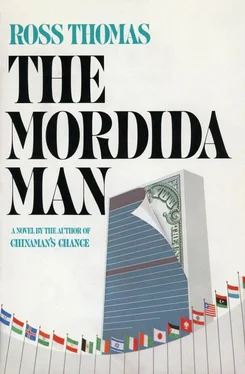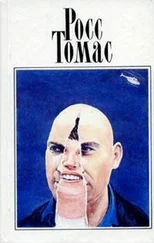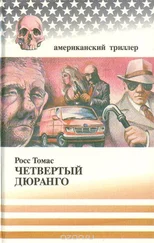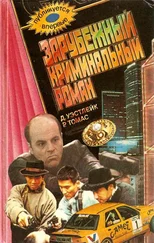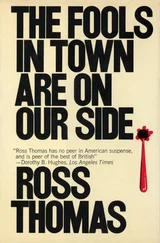“They cut it off.”
“How much time have I got?”
“Not much. Ten days maybe. No more.”
“Not much.”
“No.”
Once again Grimes sighed. “Well, if I can get hold of this one guy I’m thinking of, I can—”
The President interrupted. “I don’t really want to know.”
Grimes nodded thoughtfully. “No, sir, it’s probably better if you don’t.”
“I just want them back. Both of them.”
Grimes rose abruptly, smoothly, the way some very fat people do. “Well, I’ll sure see what I can do, Mr. President.”
Seven hours after the body of the man called Felix fell a little more than a mile into the sea, the Boeing 727 he had been shoved out of landed rather bumpily on the private potholed runway at the northern tip of the Caribbean island that for 204 years had been a British possession and was now a self-proclaimed Democratic People’s Republic.
The island was twenty-seven miles long and a mile wide at its widest point. Down its spine ran a chain of mountains whose highest peak lacked just two feet of being a mile high. On the island lived 28,047 citizens, according to the last census, which had been taken in 1974 by the British just six months prior to independence. The census had neglected to count some four or five thousand citizens who lived up in the mountains where there were no roads.
Most of the island’s citizens, nearly twenty thousand of them, lived in the capital of the republic, which was situated on its southern tip. At the northern tip was the old Mecarro coffee plantation consisting of nearly 640 acres. The landing strip was located on the plantation, which the Democratic People’s Republic had leased for five years to the American for a million dollars, all of which went into the public coffers, plus another $200,000 in cash, which had gone into the pockets of the Prime Minister, the Minister of the Interior, and the Minister of National Security.
No coffee grew on the old Mecarro plantation. No coffee had ever grown there. A rich Colombian called Mecarro had leased the land in 1936 and built himself a fine house. The next year he had planted coffee. The year after that, 1938, the great hurricane had roared by and wiped out the coffee, miraculously sparing the fine house, which had been taken over by an order of nuns. The last member of the order had died just three years before. The Mecarro plantation had stood vacant until it had been leased by the American, who was immensely rich. He was also wanted by the police of seven countries, which is the principal reason he had come to settle in the island Democratic People’s Republic. The republic had no extradition agreements or treaties. None at all. The American had already applied for citizenship.
The sixty-three-year-old pilot and the sixty-five-year-old copilot of the 727 helped the man called Arnold carry the doctor off the plane and dump him into the rear of the jeep that was driven by Jack Spiceman, the ex-FBI agent. The doctor was dead drunk.
Arnold climbed into the seat next to Jack Spiceman. When the jeep didn’t move, Arnold said, “Let’s go.”
“What about Felix?” Spiceman said.
Arnold made his right hand go out and then down in a steep plunging motion.
“No shit?” Spiceman said.
“No shit.”
Arnold wasn’t his real name, of course. His real name was Franklin Keeling, and he once had been a highly valued, highly trained, totally trusted employee of the Central Intelligence Agency. In 1975 he had been fired with rancor after $200,000 in gold disappeared in Angola. Keeling had been entrusted to deliver the gold to a right-wing Angolan revolutionary called João Machado. Nothing was ever heard of Machado or the gold again except for a signed receipt, which Keeling produced in his own defense. The validity of the receipt bitterly divided seven CIA documentation experts. Four thought it was genuine; three insisted it was a fake. Nonetheless, Keeling was fired. Nine months later, after he had spent the $200,000, Keeling went to work for the immensely rich American who now sat across from him in the main drawing room of the old Mecarro mansion and listened to his explanation about why Felix had forgotten how to breathe.
After finishing his explanation, Keeling lit a cigarette and waited to see what the rich American would say. He was fairly confident it would have nothing at all to do with Felix’s death. The rich American’s mind didn’t work that way.
“How’s the book coming?” the rich American asked.
To while away his spare hours on the island republic, Keeling sporadically worked on a manuscript which was a steamy, implausible account of his fifteen years with the CIA. Keeling thus far had managed the difficult feat of making the manuscript both dull and libelous.
“Page 218,” he said.
“Ransom, I think, don’t you?” the rich American said. “Ten million at least.”
Constant extrapolation was needed to carry on a conversation with the rich American, whose mind roamed unknown planes. The rich American’s name was Leland Timble and at nineteen he had been graduated summa cum laude from Cal Tech into the waiting arms of a Hughes think tank with headquarters in Malibu. Timble had spent five years with the Hughes firm thinking about computers. Then on one warm August afternoon in 1976, using only the touch-tone telephone in his Santa Monica apartment for a terminal, Timble had transferred thirty million dollars from the First National banks in Tulsa, Fort Worth, Omaha, Denver, Memphis, Portland, and Indianapolis to a blind account in Chase Manhattan and from there to numbered accounts in Panama and Nassau. Timble was twenty-four then; now he was twenty-nine.
So brilliantly and logically had the money been stolen that it was three full months before it was even missed. From Panama and Nassau the money was eventually traced to a Luxembourg bank, where it had been quietly withdrawn in cash over a period of two months by employees of an armored car firm who later claimed to have delivered the cash at various dates to (1) a middle-aged Frenchwoman, (2) an elderly Arab, (3) a young Texan, and (4) a nondescript Swede, none of whom could ever be found.
Three years after the embezzlement an anonymous article entitled “How Ma Bell Can Make You Rich” had been received in the mail by Scientific American. Although the title was snappy, only one of the learned editors at the magazine could even dimly perceive what the article was trying to explain, so esoteric was its symbolic language and mathematics.
The editors turned the article over to the FBI, who had it translated by a Nobel laureate, who advised them to burn every single copy unless they were willing to watch the national banking system collapse.
The only clue the FBI had was the Rio de Janeiro postmark on the envelope that the article had arrived in. It had taken special agent Jack Spiceman six months to track down Leland Timble in Rio. After a quiet chat lasting no more than fifteen minutes, Spiceman had agreed to go to work for Timble for $300,000 a year. It was Spiceman, in fact, who suggested and negotiated for the sanctuary on the island republic. And it was Spiceman who suggested that Franklin Keeling, the disgraced ex-CIA man, would make a valuable addition to Timble’s small entourage.
In a reply now to Timble’s suggestion that a ten-million-dollar ransom be considered, Keeling came back with a non sequitur, which was what his conversations with Timble often consisted of.
“The doc’s back on the sauce,” he said. “Dead drunk.”
“I should think the United Nations again, don’t you?”
“You still want to use Old Black Joe?” Keeling said.
Old Black Joe was what Keeling called Dr. Joseph Mapangou, Gambia’s permanent representative to the United Nations. On an annual retainer of fifty thousand dollars, Dr. Mapangou had proved useful in a number of ways, not the least being his uncanny ability to be first with the latest rumor. It was Dr. Mapangou, in fact, who had come up with the hint that Anvil Five might be found in London.
Читать дальше
